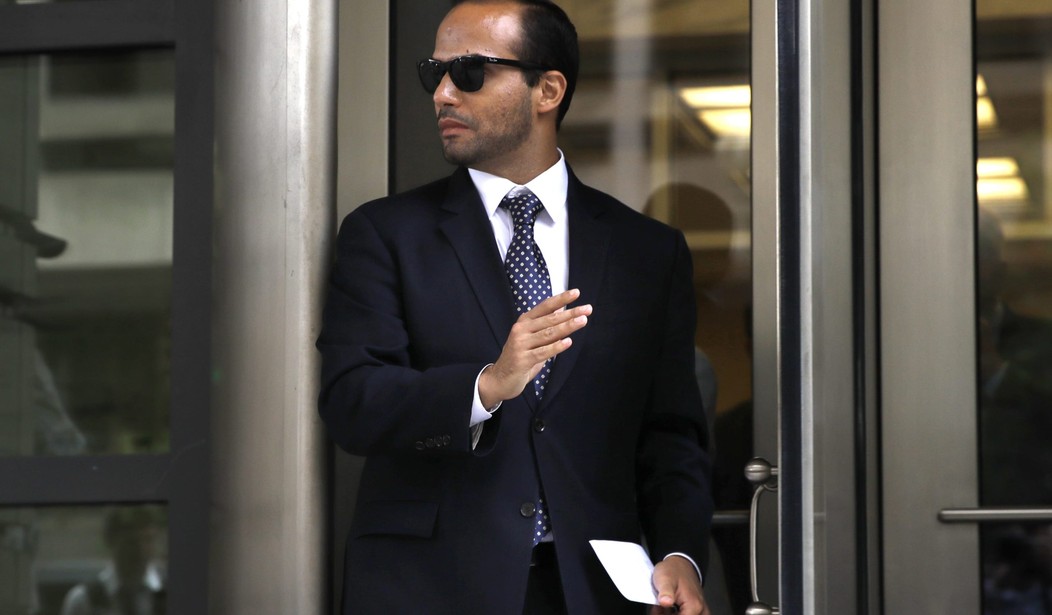In an explosive new report Thursday, The New York Times admitted that multiple “informants” were used in the FBI’s “Crossfire Hurricane” investigation into the Trump campaign in 2016 — and that can only mean one thing. Inconvenient truths about the CIA and FBI’s espionage campaign against Team Trump are about to break loose and some complicit Deep State actors are trying to get ahead of the narrative.
Appears that information about FBI effort to spy on Trump campaign now shaking loose in anticipation of inspector general report. https://t.co/1X4TFQ5396 pic.twitter.com/O8u449mDN1
— Byron York (@ByronYork) May 2, 2019
The Times’ report centers around Azra Turk, an alleged FBI (or possibly CIA) asset who met with Trump campaign adviser George Papadopoulos at a London bar in September 2016. The report calls the American government’s affiliation with the woman a “previously unreported detail of an operation.”
However, more than a year ago, The Daily Caller’s Chuck Ross mentioned Turk in his report on FBI informant (spy) Stefan Halper, a foreign policy expert and Cambridge professor who had numerous suspicious meetings with Papadopoulos and Trump adviser Carter Page in London.
According to the Times, Turk had set up the meeting ostensibly to discuss foreign policy issues, but — surprise! — “she was actually a government investigator posing as a research assistant, according to people familiar with the operation.”
So, Adam, I feel like there’s a 3-letter word to substitute “an FBI investigator posing as a research assistant who set up a meeting with a Trump campaign aide.” Maybe an editor can help https://t.co/CnRRCbwEoz
— Julie Kelly (@julie_kelly2) May 2, 2019
Supposedly, the woman was in London “as part of the counterintelligence inquiry opened that summer to better understand the Trump campaign’s links to Russia.”
The decision to use Ms. Turk in the operation aimed at a presidential campaign official shows the level of alarm inside the F.B.I. during a frantic period when the bureau was trying to determine the scope of Russia’s attempts to disrupt the 2016 election, but could also give ammunition to Mr. Trump and his allies for their spying claims.
Yes, stories about government spies spying on a political campaign do have a tendency to fuel accusations of spying. The Times really nailed it there.
“…but could also give ammunition to Mr. Trump and his allies for their spying claims.” Gee, ya think?
— Debra Heine (@NiceDeb) May 2, 2019
More like: “The decision to use Ms. Turk in the operation aimed at a pres. campaign official shows the level of alarm inside the F.B.I. during a frantic period when the bureau” … was freaking out over the possibility that Trump could win.
— Debra Heine (@NiceDeb) May 2, 2019
Ms. Turk helped oversee “the politically sensitive operation,” working alongside Halper, according to the Times.
The move was a sign that the bureau wanted in place a trained investigator for a layer of oversight, as well as someone who could gather information for or serve as a credible witness in any potential prosecution that emerged from the case.
That’s one way of looking at it. Here is another:
The NYT piece confirming the Obama admin’s global spy operation against Trump admits one of its spies used a fake name, lied about her job, doesn’t appear to work for the FBI, works and lures targets overseas, and yet had authority over a foreign spy op. Sounds kinda like CIA. pic.twitter.com/sSAWgujxFs
— Sean Davis (@seanmdav) May 2, 2019
This account was described in interviews with people familiar with the F.B.I. activities of Mr. Halper, Ms. Turk and the inspector general’s investigation. They spoke on the condition of anonymity because they were not authorized to discuss the subjects of a continuing inquiry.
As part of Mr. Horowitz’s investigation, his office has examined Mr. Halper’s past work as an F.B.I. informant and asked witnesses about whether agents had adequate control of Mr. Halper’s activities, people familiar with the inquiry have said.
While in London in 2016, Ms. Turk exchanged emails with Mr. Papadopoulos, saying meeting him had been the “highlight of my trip,” according to messages provided by Mr. Papadopoulos.
“I am excited about what the future holds for us :),” she wrote.
Weeks before Mr. Papadopoulos met with Ms. Turk and Mr. Halper, the F.B.I. had opened its investigation into the Russia effort — based largely on information that Mr. Papadopoulos had relayed to an Australian diplomat about a Russian offer to help the Trump campaign by releasing thousands of hacked Democratic emails.
Papadopoulos was fed that information by another probable Western informant, the mysterious Maltese professor Joseph Mifsud, who vanished from the public eye in late 2017.
The F.B.I. received the information from the Australian government on July 26, 2016, the special counsel’s report said, and the bureau code-named its investigation Crossfire Hurricane.
Investigators scrambled to determine whether Mr. Papadopoulos had any Russian contacts while deciding to scrutinize three additional Trump campaign aides who had concerning ties to Russia: Paul Manafort, its chairman; Michael T. Flynn, who went on to be the president’s first national security adviser; and Mr. Page.
Secrecy was paramount for the F.B.I. officials because of the sensitivities of investigating campaign advisers during a presidential race. Had the investigation into Trump advisers’ contacts with Russia become public, it could have devastated the Trump campaign. And top bureau officials were enduring fresh attacks over their handling of the Hillary Clinton email investigation.
One of the agents involved in the Russia inquiry, a seasoned counterintelligence investigator out of New York, turned to Mr. Halper, whom he viewed as a reliable and trusted informant. They had a longstanding relationship; the agent had even spoken at an intelligence seminar that Mr. Halper taught at the University of Cambridge, discussing his work investigating a Russian espionage ring known as the illegals.
The Federalist’s Molly Hemingway discovered that three agents publicly identified as speaking at that intelligence seminar, and one of them currently serves as the special agent in charge in the FBI’s New York office, and at one time worked closely with Preet Bharara, former U.S. attorney for the Southern District of New York, “a virulent anti-Trump activist whom the president fired in 2017.”
Papadopoulos, meanwhile, disputed on Twitter the NYT’s contention that Turk was working with the FBI, pointing out that she could barely speak English and seemed to be focused on his work in the energy sector.
I agree with everything in this superb article except “Azra Turk” clearly was not FBI. She was CIA and affiliated with Turkish intel. She could hardly speak English and was tasked to meet me about my work in the energy sector offshore Israel/Cyprus which Turkey was competing with https://t.co/wbyBnvb6io
— George Papadopoulos (@GeorgePapa19) May 2, 2019
Halper’s efforts to snoop on Trump continued well after the election and into 2017, according to the Times.
He was invited as part of a group of China experts to meet with White House advisers in 2017. Mr. Halper informed the F.B.I. of the invitation but was not provided with any guidance, people familiar with the episode said.
“The London operation to yielded no fruitful information,” the Times admits. “But F.B.I. officials have called the bureau’s activities in the months before the election both legal and carefully considered under extraordinary circumstances.”
Inspector General Horowitz will be the judge of that, and the results of his investigation could be made public as early as this month.
Update:
President Donald Trump’s 2020 campaign manager Brad Parscale said in a statement Thursday:
There is a word for this in the English language: Spying. Democrats and their media friends have expressed horror at the term, but there is no other way to describe it: The FBI spied on the Trump campaign in 2016. For two years, Democrats and their allies in the media have lied to the American people about the Russia collusion hoax, when all along the real scandal was the Obama Administration using the Justice Department to spy on a political adversary’s campaign. As President Trump has said, it is high time to investigate the investigators.
George Papadopoulos appeared on Tucker Carlson Tonight Thursday to discuss the latest revelations.









Join the conversation as a VIP Member